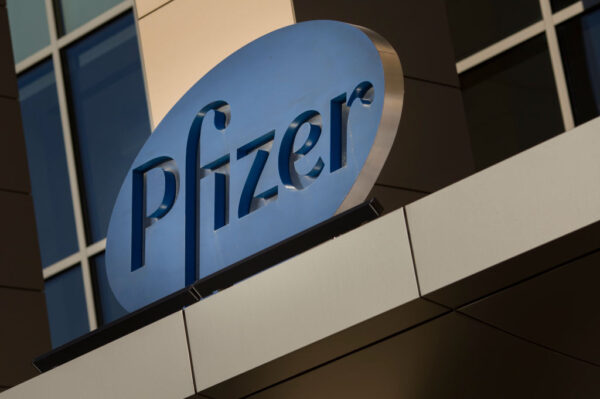
The entrance to a Pfizer office in Cambridge, Massachusetts
Two vaccine candidates for Covid-19 under development by Pfizer and a German partner have received fast-track designation from the Food and Drug Administration, the companies said.
The New York-based drugmaker and BioNTech, based in Mainz, Germany, said Monday that they had received the designation for BNT162b1 and BNT162b2, both messenger RNA-based vaccines against the SARS-CoV-2 virus that are among the four under development in the BNT162 mRNA vaccine program. Both vaccines are currently in Phase I/II development, and the companies said they may start a Phase IIb/III study as early as this month that would enroll up to 30,000 subjects.
Shares of Pfizer were up nearly 5% in late-morning trading on the New York Stock Exchange, while shares of BioNTech were up more than 15% on the Nasdaq following the news.
Pfizer and BioNTech’s nearest competitor is Cambridge, Massachusetts-based Moderna, which is also developing an mRNA vaccine, mRNA-1273, which it also plans to enter into Phase III testing this month.
In a note to investors, Cannacord Genuity analyst Arlinda Lee wrote that with data from the BNT162 in addition to data posted online earlier this month, more data from the BNT162 program are also expected this month, per Pfizer and BioNTech’s announcement. And with eight cancer drug candidates in the pipeline, she and colleagues were optimistic about BioNTech’s prospects for generating clinical proof-of-concept data and meaningful datasets.
The BNT162b1 data were posted on a preprint server and are currently undergoing peer review for potential publication in a medical journal. The data showed that healthy volunteers participating in the Phase I/II study achieved concentrations of neutralizing antibodies in the blood that were 1.8 to 2.8 times those of Covid-19 patients who had recovered from the illness. The study randomized and vaccinated 45 adults aged 18-55 who received the vaccine in two doses, 21 days apart, at 10 micrograms, 30 micrograms or 100 micrograms. Pain at the injection site was the most common side effect, occurring more frequently among those receiving the vaccine than among those receiving placebo. While nearly all were mild or moderate, one participant who received the vaccine at 100 micrograms experienced severe pain after the first dose. Some participants also experienced fever and trouble sleeping.

Health Benefit Consultants, Share Your Expert Insights in Our Survey
Share some of the trends you are seeing among your clients across healthcare, including chronic conditions, behavioral health, healthcare navigation, and more.
Photo: Dominick Reuter, AFP, via Getty Images














